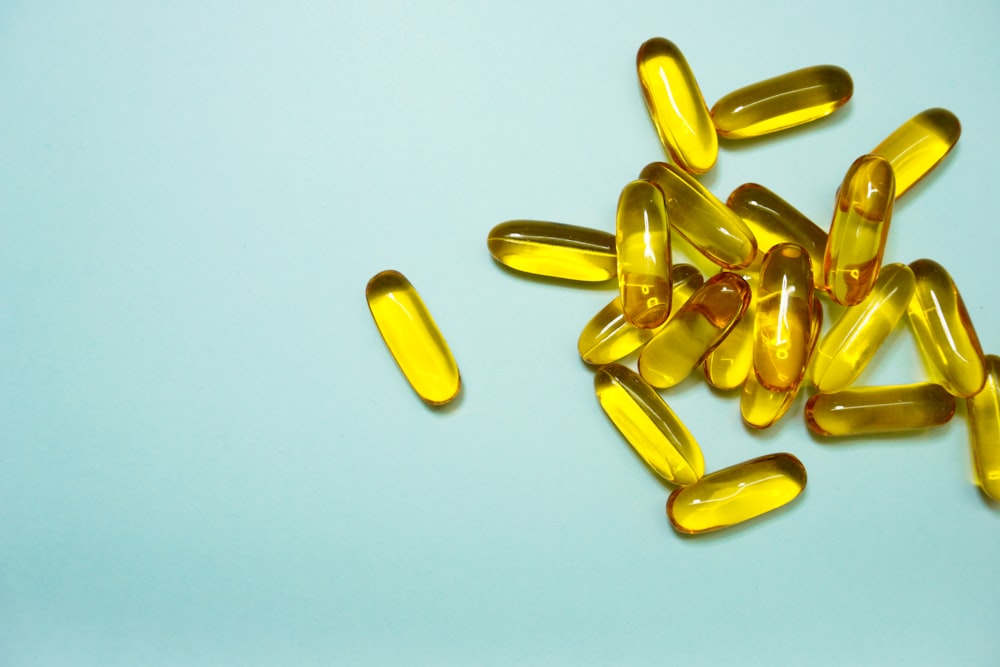Metafact Review: Supplements
Chances are that you have some sort of supplement in your kitchen cupboards. Depending on the product that could be tablets, pills, oils or even drops. There are a whole range of substances on offer as well, and they all promise to help our health in some way or another. Vitamin C supplements claim to protect our immune system. Omega-3 supplements claim to help you heart, while creatine is used for improving cognition. But do they all do as they claim?
We asked scientists and clinicians to share the facts on supplements. Are Vitamin C or Vitamin D supplements needed to be healthy? What about multi-vitamins? Do those ‘anti-ageing’ products actually work? And do we need any supplements if we go vegan?
Here’s what we found.
Meta-Index
77%: Proportion of people in the USA that use supplements
58%: Proportion of people in the USA that use supplements in past 30 days
$164b: size of the dietary supplements market worldwide in 2022.
$46b: size of the global multivitamin market worldwide in 2021.
23%: reduction of hospitalisation due to diarrhea in children supplemented with zinc.
2000: micrograms of vitamin B12 recommended for vegetarians per week.
25%: percentage of people with iron deficiency.
0.5: teaspoons of iodized salt required to meet daily needs of iodine.
BACKGROUND
Tips to think about supplements
For supplements in general, there are two important things to keep in mind:
1) A good diet is often all you need
The fact that a substance plays a role in a certain biological process means that supplementing it will probably be helpful if we are deficient. However, if we already get enough of it from our diet or elsewhere, a supplement will not do much at all. Some vitamins aren’t readily available via the diet (Vitamin D), but alot are!
2) What happens in the body when supplements are broken down?
Remember that your body breaks down everything you eat into building blocks. Investigate what the supplement breaks down to, not what it is made of. For simple molecules, like vitamin C (ascorbic acid) what you see is what you get - our body uses it as is. However collagen breaks down into amino acids during digestion. Collagen supplements therefore may not be more advantageous than eating proteins like steak or lentils. In fact, they are often a poorer source of protein than these food sources.
CONSENSUS
Is fish oil good for heart health?
Fats come in many different forms, and their impacts on our health can differ greatly. Fish oil is well-known for its omega-3 fatty acids, and studies have suggested that these compounds could potentially provide benefits for your heart. Omega-3s may have the potential to lower triglyceride levels, reduce inflammation in the body, and lessen the risk of heart disease. Is that true?
“Yes. Fish oil is good for heart health, with direct and indirect effects” writes Dr Theresa Larkin, an expert in omega-3 supplementation at the University of Wollongong. “Fish oil contains long chain omega-3 polyunsaturated fatty acids, often just called omega-3 fatty acids. These can lower inflammation and have positive benefits on the health of our heart and blood vessels. The direct effects of fish oil on heart health are in the heart itself. When there are more omega-3 fatty acids in the membranes of the heart’s cells, these cells function better. Fish oil can lower a high heart rate and can also reduce the risk of irregular heart rhythms” she writes.
“The indirect benefits of omega-3 fatty acids on the heart are via their effects on the blood vessels and factors in the blood. Fish oil can reduce triglycerides in the blood and prevent blood from clotting too much. They also relax the muscles of the blood vessels. These effects can reduce blood pressure and allow the heart to contract more efficiently and use less energy. People who consume higher levels of fish oil have a lower risk of heart disease and lower risk of death due to heart disease.”
Other experts agree on the promise of fish oil, but clinical trials have generally shown mixed results. “The basic research shows promising effect of fish oil on thrombus formation and on cellular injury” writes Professor Jawahar L. Mehta, cardiologist from the University of Arkansas for Medical Sciences. “In some clinical trials in patients with very high triglyceride levels and previous cardiac events, the use of fish oil especially high concentrations of EPA looks very good. Unfortunately, the large number of trials on the use of fish oil in patients with heart disease do not reveal very promising results. This is true in both primary and secondary prevention trials.”
Are Vitamin D supplements necessary for maintaining good health?
62% Likely via 13 experts
With half of the population having a Vitamin D deficiency, a key question is whether supplementation is important to maintain good health?
Dr Vanessa Meyer, an expert in physiology from Witwatersrand University, says “There is a lot of evidence at a molecular and cellular level to suggest that maintaining an optimal vitamin D status is essential for good health”. She explains that “Vitamin D plays a role in many physiological responses including calcium homeostasis and bone health, immune function and cellular differentiation. As such, vitamin D deficiency has been associated with a myriad of diseases.” Some of these diseases include bone deformities such as rickets and osteomalacia.
Dr Evertine Wesselink, a nutrition expert from Wageningen University in the Netherlands, adds that “Vitamin D also plays a role in muscle functioning and glucose and fat metabolism. Therefore, maintaining a sufficient vitamin D status (> 50nmol/L) is important.”
Sunlight is the main source of vitamin D. Exactly how much sunlight you need to get your recommended Vitamin D requirements depends on your skin type and the climate of where you live. Vitamin D can also be found in some foods like red meat, egg yolks and oily fish. You can also get Vitamin D by taking supplements.
So are supplements needed? Although there seemed to be a debate on this one - it was very clear from most of the experts that you should considering taking supplements if your diet or location doesn't allow the necessary Vitamin D levels.
Dr Ramune Jacbosen, an expert in pharmacology from Copenhagen University in Denmark, says “in high latitude countries, where there is not enough sun during winters, supplementation (in Denmark, 10 mikrogr per day) is recommended to people with increased risk of vitamin D deficiency, e.g. elderly, pregnant women, people with darker skin.”
Dr Meyer summarises: “So, are vitamin D supplements necessary for maintaining good health? This depends on your status and risk factors for deficiency. If you are unsure about your vitamin D status and whether or not you should be supplementing, consult your healthcare provider advice.”
CONSENSUS
Does creatine improve cognition?
Creatine is a natural compound, made up of three amino acids: arginine, glycine and methionine. It's present in small amounts in the body, mainly in our muscles and brains and promotes the production of ATP (adenosine triphosphate), which gives our cells the energy they need to function properly. For this reason, athletes and bodybuilders often use creatine as a dietary supplement for increasing muscle strength and physical performance. But recent claims suggest it may improve cognition? Overall there is promise, but mixed opinions among the experts.
“Based on the clinical research and animal studies, creatine (Cr) supplementation has been demonstrated to improve cognitive function in numerous domains (e.g., short-term memory, spatial memory)” writes Dr Xuansong Mao, an expert from Virginia Tech in Sports Science. “Although Cr supplementation seems to be a promising approach for improving some cognitive domains, it is very unknown as to how Cr boost cognitive processing in the brain.”
Neurology experts were less convinced. “There are mixed results from animal and human research in this area, with mixed supplements given (some containing other substances than creatine e.g. in sports supplements with sugars/proteins added), at mixed doses (much higher in animals) over mixed periods (high dose/short time; low dose/long time) in different populations (e.g. vegan/vegetarian) with mixed output variables (cognitive tasks, neuroimaging)” writes Dr Phillip Dean, a Neuroscientist from University of Surrey.
“Whether oral creatine supplementation increases creatine in the brain is still not certain. Whilst some studies seem to infer that oral creatine supplementation can increase creatine in the brain, these are not usually done at the same time as cognitive tests or other neuroimaging. It becomes trickier still when looking at Phosphocreatine vs Creatine in the brain, and when accounting for the osmotic properties of creatine (water retention) which can effect data collected. Any relationship between cognition and creatine might be caused by increases in the body, other substances in the supplement or placebo effects. Properly powered and controlled studies are needed to understand potential mechanisms.”
Important to know that creatine supplementation may have potential side effects such as gastrointestinal issues, muscle cramps, and dehydration, so it is important to consult a healthcare professional before starting to take creatine supplements.
Are Vitamin C supplements necessary for maintaining good health?
80% Negative via 5 experts
Vitamin C or ascorbic acid is a water soluble essential vitamin. Several foods contain vitamin C. Citrus fruits, cantaloupe, strawberries, papayas and mangoes are notable sources among fruits. Cabbage-type vegetables, dark green vegetables (like green peppers and broccoli), lettuce, tomatoes and even potatoes are some of the vegetables that provide vitamin C. Vitamin C is easily destroyed by heat and oxygen, hence eating whole raw fruits and some raw/steamed vegetables are recommended.
Adult men and women older than 19 yrs require 90 mg/day and 75 mg/day, respectively with smokers/passive smokers needing 35 mg/day more than their non-smoking counterparts. Consuming five varied servings of fruits and vegetables a day will provide an adequate amount of vitamin C, therefore, making supplementation unnecessary.
There are some individuals who might be at risk of vitamin C inadequacy. Deficiency symptoms include anemia, athrosclerotic plaques/pinpoint hemorrhages, bone fragility, poor wound healing, bleeding gums and loose teeth, muscle degeneration, rough skin and blotchy bruises.
All experts agreed that anyone can get enough vitamin C from a good diet to maintain good health. “Given that adults usually have on average 2 colds per year, lowering a cold duration by ~8% is quite small when considering vitamin C supplementation for 365 days. Nevertheless, in special conditions regular supplementation can be reasonable for the purpose of alleviating respiratory virus infections.For example, when someone frequently suffers from colds, regular vitamin C might be worth trying” writes Dr Harri Hemila.
Overall a good diet “should always be the first course of action” writes Professor Vissers. “This means eating fresh fruit and vegetables. Your body will not store vitamin C, so this needs to be a regular habit, not an occasional activity. Supplements are only recommended if you cannot access the food you need. Very sick people need more vitamin C daily, and a supplement may be recommended for this.”
CONSENSUS
Do multivitamins make you healthier?
Many of us take multivitamins frequently in the hope that they will keep us in good health. Multivitamins are the most frequently used supplement (estimates suggest about one in three people regularly take them). They are supposed to contain most essential vitamins and minerals at levels close to recommended daily requirements, but there is no standard regulatory definition of what nutrients or what level of them a multivitamin must contain.
"Adherence to a daily multivitamin regimen has been clearly shown to fill gaps between actual intakes of micronutrients and recommended amounts and to support associated biochemical and cellular functions and structures of our bodies," writes Prof Jeffrey B Blumberg from Tufts University.
Yet, the evidence is mixed on their benefits. According to Dr Gideon Meyerowitz-Katz from the University of Wollongong, "in general, there does not appear to be strong evidence that multivitamins improve health for people who are otherwise healthy and have a balanced diet. There are some epidemiological studies that suggest an association between multivitamins and good health, but these are likely confounded - essentially, we can see that people who take multivitamins are healthy, but they are also rich, exercise more, smoke less etc, so it's hard to know if it's the multivitamin making them healthy or the other aspects of their lives."
Having said that, so long as they are consumed at the right dose, they might provide benefits for some people. "Supplementation when a deficiency is present or in certain life-stages when dietary requirements are increased (infancy, pregnancy and when breastfeeding, elderly), is recommended to prevent the serious consequences of some of the micronutrient deficiencies," explains Dr Cornelie Nienaber-Rousseau from North-West University.
Quick Answers
Can you take too much Vitamin D? 100% Yes. “Signs and symptoms of vitamin D toxicity include increased urination, nausea, vomiting, kidney stone, constipation, confusion and calcification of soft tissues,” explains Dr Charoenngam. An overdose of vitamin D is hard to achieve however, unless you have a genetic hypersensitivity (which is very rare) or overdo it with the tablets. “Interestingly, natural synthesis of vitamin D through brief exposure to the sun will not result in too much vitamin D production. This is because your body will naturally counteract excessive production,” writes Dr Vanessa Meyer from the University of the Witwatersrand in South Africa.
Do antioxidant supplements work at reducing free radicals? Synthetic antioxidants do scavenge free radicals in the body, which have been implicated in conditions like cancer or heart disease. However, it does not look like antioxidants reduce risk for disease.
Do cranberry supplements prevent urinary tract infections? Cranberry supplements contain a substance that prevents bacteria from sticking to the walls of the bladder and could thus help prevent urinary infections - but the evidence suggests it’s small and they don’t seem to work for treating infections.
Do resveratrol supplements help against heart disease? Despite the hype and the fact that these supplements are beneficial in rodent studies, it is still unclear whether they can help in humans.
TOP ANSWER
Are vitamin B12 supplements sufficient for a vegan diet?
Vitamin B12 – otherwise known as cobalamin – is a water-soluble vitamin found in animal by-products, such as meat, fish and dairy. Other sources include fortified cereal, breads and plant milks. People who don’t regularly consume products containing B12 are at risk of becoming deficient. It is recommended that vegans aim to consume at least three micrograms of B12 daily through fortified foods, or by taking a regular B12 supplement.
However, B12 deficiencies can develop for reasons other than diet (e.g. inadequate absorption of vitamin due to an autoimmune disorder such as Pernicious Anaemia), Therefore it is recommended that regardless of dietary intake, if an individual experience symptoms of B12 deficiency (e.g. fatigue, lethargy, breathlessness, mouth ulcers, muscle weakness and problems with memory) that they seek support from their healthcare providers.
Dr Heidi Seage
An expert from Cardiff Metropolitan University in Health
Takeaways
Vitamins can be supplemented, but supplements are not normally needed if we follow a balanced diet. They are unlikely to provide benefits unless we are deficient.
Supplementation is important when a deficiency is present or in certain life-stages when dietary requirements are increased (infancy, pregnancy and when breastfeeding, elderly).
Too much of a vitamin can be dangerous. It is hard to get an overdose from food but very much possible with supplements, so watch out.
Like it or not, a healthy diet and exercise remain our best tool for keeping healthy.






